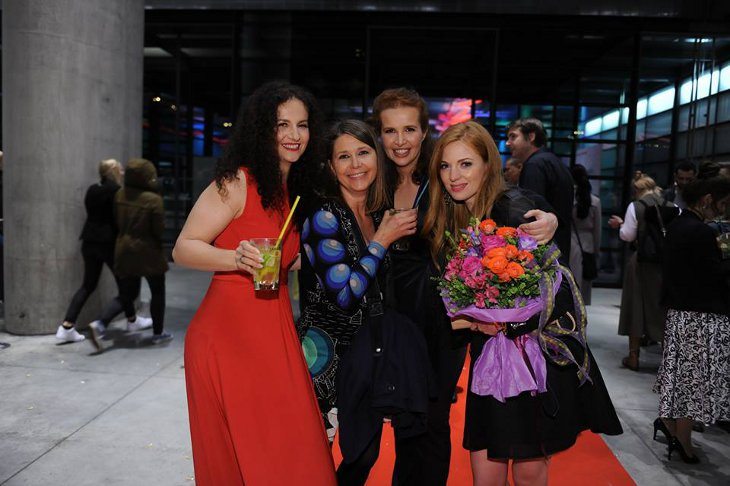Anita i Ivona Juka: “Zanemareni ženski glas mora dobiti važniju ulogu u filmskoj industriji”

Nakon što je iz Crne Gore stigla vijest da je “Ti mene nosiš” u utrci za najprestižniju filmsku nagradu Oscar, i to upravo kao crnogorski kandidat, Ivona i Anita Juka prije odlaska na American Film Market u Los Angeles, gdje će pred američkom publikom, novinarima i distributerima promovirati film, odgovorile su na nekoliko pitanja za Ziher. Ivonin debitantski uradak već je proglašen najboljim filmskim ostvarenjem na našim prostorima u posljednjih 20 godina od strane domaćih kritičara, a njegova promocija svijetom tek počinje. Veliki The Hollywood Reporter utro je taj put svojom recenzijom filma po završetku Sarajevo Film Festivala, a u međuvremenu je “Ti mene nosiš” osvojio 7 nagrada – u Puli njih četiri (nagrada Breza za najbolju debitanticu te Zlatna arena za najbolju kameru, najbolje vizualne efekte i najbolju glazbu), Zlatnu mimozu za najbolju režiju u Herceg Novom te Grand Prix za najbolji film na Avvantura Film Festivalu u Zadru i bečkom Let’s Cee Film Festivalu. Ziherovu recenziju filma možete pročitati ovdje.
Crna Gora vas kao svog kandidata šalje u utrku za nominaciju za Oscara. Koliki je značaj koprodukcije (u Vašem slučaju filmske suradnje između Hrvatske, Srbije, Crne Gore i Slovenije) na našim prostorima, ali i šire?
Ivona Juka: Divno je kad nešto ujedinjuje i povezuje ljude. Toliko ljudi iz obje zemlje, i Crne Gore i Hrvatske, navija za ovaj film. Nakon mnogo vremena pojavio se film koji je drugačiji od drugih, koji ne razdvaja ljude po naciji već ih ujedinjuje u njihovim nesrećama, sreći, samoći, čežnjama, ljubavima, odanosti i svemu što nosimo u sebi. Prošlo je već preko dvadeset godina od ratnih sukoba, ljudi na ovim prostorima žive sasvim normalne životne priče. Ljudima s ovih prostora dosta je ubijanja, mržnje i monstruma, kao i filmova o tome, oni žele priče na koje imaju pravo i koje doista žive svojim vlastitim postojanjem. Mnogo mi znači što brišemo granice i što nacije koje su nekad ratovale s ponosom mogu osjećati svojim, kad film doista i jest zajednički. Kako je jedan kritičar lijepo napisao – ovo je film koji ne dovodi na pozornicu prošlost, već sadašnjost, koji ne dovodi nacionalnost, već Čovjeka. I upravo to spaja Crnu Goru i Hrvatsku, žudnja za Čovjekom u središtu priča.
„Ti mene nosiš“ izazvao je veliku pažnju u Hrvatskoj, ali i regiji i šire. Što mislite, što je presudno za takvu popularnost?
Ivona Juka: Rekla bih da je film „Ti mene nosiš“ izazvao snažne emocije kod publike, više nego veliku popularnost. Ljudi su pod dubokim dojmom uvjerljivosti, identificiraju se s likovima i, kako kažu, „nose film danima u sebi“. Kadrovi koji se pred njima pojavljuju tjeraju ih na promišljanje o vlastitom životu, odnosima, i cijelom spektru situacija u kojima se nalaze. Tome je svakako pridonijela tema koja jest životna – ona je o svima nama, o našem životu, o onome što nam je poznato i blisko, a ne nekom drugačijem, dalekom ili egzotičnom životu. Također, film je o nama danas, ne o prošlosti, ne o povijesti, već o sadašnjosti. „Ti mene nosiš“ ne bavi se vanjskim obilježjima, ne bavi se rasom, nacijom, čak ni socijalnim statusom, već se bavi čovjekovom nutrinom, onime što čovjek jest i što ga najviše zaokuplja – život.

Odnos oca i kćeri nije česta tema filmova, pogotovo da kćeri imaju tako aktivnu ulogu u tom odnosu, odnosno da se one brinu o očevima. Dora se brine o svom zbunjenom ocu, Nataša o ocu s kojim je prekinula veze, a Ives o ocu koji boluje od Alzheimera. Zašto je za vas ovo bila važna tema?
Ivona Juka: Bila mi je bitna aktivna uloga ženskih likova, da su žene te koje se suočavaju s problemima, a ne da se umjesto njih netko drugi suočava i riješava te probleme. Istovremeno, naš film ne ide u suprotnu krajnost i ne prikazuje žene kao svemoguće junakinje, već kao normalne osobe koje su kao svako ljudsko biće neminovno limitirane i nemoćne u nekim situacijama, ali su nosioci radnje. One se suočavaju s problemima, padaju, ustaju i traže rješenja.
Uz to, kako kažete, kćeri su rijetko prikazane u toj aktivnoj ulozi, a stvarnost pokazuje da su sve češće nositeljice obitelji, pogotovo u današnje vrijeme kad populacija stari. Sve tri priče redefiniraju prikaz odnosa očeva i kćeri, a priča Ives i oca koji boluje od Alzheimera jest jedna od ključnih, jer u toj priči otac u potpunosti ovisi o kćeri. Alzheimer je bolest koja je sve više u porastu i s kojom se sve više obitelji suočava. Ta priča nosi vrlo poznat i blizak emocionalni vrlog koje prolaze osobe bliske oboljelima. Međutim, bolest nije kraj odnosa i čvrste povezanosti oca i kćeri, baš kao ni druge prepreke u ostalim pričama. Naizgled kćeri nose očeve, ali i odnos s tim roditeljem, ocem, nosi njih.
U konkurenciji od 81 filma koji se natječu za nominaciju za Oscara za najbolji strani film bilježimo tek 9 redateljica. Osim toga, filmska industrija iznjedrila je brojnu poznatu braću, počevši od braće Lumiere, Darden, Cohen i brojnih drugih, međutim rijetko čujemo za uspješne sestre u filmu. Vaša sestra je redateljica, a vi ste producentica – obračunavaju li se sestre Juka u svojim filmovima s rodnim stereotipima?
Anita Juka: U filmskoj industriji još uvijek pretežno rade muškarci. Poznato je da se u većini suvremenih filmova radi o muškom heroizmu, muškarac često ima ulogu spašavanja i tješenja ženskog lika i na sebe preuzima odgovornost rješavanja problema.
U pravu ste, “Ti mene nosiš” izokrenuo je tradicionalnu paradigmu. Predstavlja tri različite žene koje se bore da budu prihvaćene, bore se za iskupljenje i nove prilike. U današnjem društvu zanemareni ženski glas mora dobiti važniju ulogu u filmskoj industriji. Unutar tog konteksta, Dora, Nataša i Ives zauzimaju se za sve žene čije su uloge u filmu inferiorne ulogama muškaraca koji glume s njima. Ograničen pogled na ženske uloge dio je dominantne ideologije i mediji često prenose tu ideologiju u filmove i televizijske emisije koje su namijenjene za zabavu i konzumaciju od strane gledatelja nesvjesnih poruka koje primaju. Film koji se odupire konvencionalnim načinima portretiranja ženskih likova, kao što to “Ti mene nosiš” radi, ima veliki utjecaj na razmišljanje gledatelja o ženstvenosti, rodnih ulogama, starenju…
Nas dvije, kao sestre, zainteresirane smo pričati priče i o muškim i ženskim karakterima, ali, naravno, ženski karakteri u našim filmovima jednako su multidimenzionalni kao i muški. Zbog toga smatram da je važno imati što više ženskih autora, redateljica, jer na taj način se podiže kvaliteta i produbljuje sadržaj filmskih priča. Ja radim sa sestrom redateljicom i nadam se da ćemo zajedno napraviti još sjajnih filmova, baš poput braće koju ste spomenuli. Istina, zasad smo rijetka pojava, ali nadam se da će se to promjeniti i da će biti više žena koje se bave filmom.
YOU CARRY ME TRAILER with english subtitles from 4film on Vimeo.
After we received news from Montenegro that You Carry Me has become Montenegro’s nominee for the most prestige movie award, The Academy Award (also known as Oscar), Ivona and Anita Juka have, before leaving for The American Film Market in LA where they will promote the film in front of journalists and distributors, answered some questions for Ziher. Ivona’s debutant film has already been declared as the biggest achievement in the Eastern Europe’s film industry in the last 20 years, and its worldwide promotion is just beginning. The great Hollywood Reporter has paved the way with its review of the film after Sarajevo Film Festival ended. In the meantime, You Carry Me has won 7 awards – four in Pula (Breza Award for Best Debutant movie, Golden Arena for Best DOP, Best Visual Effects and Best Music), Golden Mimosa for Best Directing in Herceg Novi and Grand Prix for Best Film on Avvantura Film Festival in Zadar and Vienna’s Let’s Cee Film Festival. You can read Ziher’s review of the film here.
Montenegro has nominated you for its official candidate for the Oscar awards. As „You Carry Me“ has been made in Croatian-Montenegrin-Serbian-Slovenian co-production – countries which have been in war until 20 years ago – is this a confirmation that art has the power to unite? How important is cooperation and co-production in our region?
Ivona Juka: It’s wonderful when something binds and brings people together. So many people from Montenegro and Croatia are rooting for this film. Finally, after a long time, a film different from the others we have seen so far has emerged, one which does not differentiate between people based on nationality, instead uniting them with the fundamental feelings that all of us carry in ourselves: happiness, loneliness, love, loyalty and so on. Since more than twenty years have passed from the terrible ravages caused by war, people in this area are beginning to lead more and more normal lives and are fed up with the killing, hatred, monsters, as well as films dealing with these themes. They want films they deserve and which reflect their own reality. It means a lot to me, that we are erasing state borders, and that “You Carry Me” can proudly be considered joint production of two nations that were not that long ago involved in an armed conflict. As one film critic noted – this is a film that does not concentrate on the past but on the present, it does not concentrate on nationality but on the Human. And this is exactly what links Montenegro and Croatia together: our desire to put the Human and human experience in the centre of the story.
The film “You Carry Me” has received great attention not only in Croatia, but in the whole region as well. What do you think was the reason behind this popularity?
Ivona Juka: In my opinion, the film “You Carry Me” has provoked strong emotions in the general public, more than it achieved popularity. People identified with its real depiction of life and they identified with the characters. Many people said that “they carried the film within themselves for days”. The scenes made them re-evaluate their own lives, relationships, as well as the whole spectrum of situations in which they find themselves day after day. The film’s theme has certainly contributed to that because it’s about all of us, about our lives and what we are familiar with. It doesn’t represent something different, faraway and exotic. Additionally, the film deals with modern issues, not with history. It deals with our innermost feelings and machinations, and not with questions of race, nation or social status.
![[Anita Juka] Foto: Franjo Matković](http://www.ziher.hr/wp-content/uploads/2015/11/12205055_10153257257318697_842301654_n.jpg)
Foto: 4Film/Franjo Matković
A father-daughter relationship is not a common topic in films. Especially a relationship in which the daughter has such an active role because we don’t usually see daughters taking care of their fathers (in films). Dora cares for her confused father, Nataša worries about her father with whom she has ceased all contact, and Ives looks after her father who has Alzheimer’s. Why was this an important topic for you while you were making this film?
Ivona Juka: I want my female characters to have active roles, I want women to confront their problems, instead of having someone solve those problems for them. But at the same time, the film doesn’t go to the opposite extreme. The female characters are not superwomen, they are normal people who, like anybody else, are helpless in certain situations, nonetheless, they are still the main characters. They face their problems, they fall and get up again, they look for answers. It’s true, daughters rarely have an active role, but in reality, daughters often support the rest of their family. Especially today when most of the population is getting older. All three stories redefine how the father-daughter relationship is represented, and the story about Ives and her father who has Alzheimer is one of the key stories because in that story, the father entirely depends on his daughter. Alzheimer’s is on the increase and more and more families have to deal with it. That story shows the emotional vortex that the family members of a diseased person have to go through. However, that disease doesn’t affect the strong father-daughter bond in the story, and neither do the obstacles in the other stories. Seemingly, the daughters carry their fathers, but the father-daughter relationship is the one that “carries” the daughters.
Out of 81 films competing for the Academy Award nomination for Best Foreign Language Film, there are only 9 female directors. Furthermore, the film industry gave rise to many famous brothers, starting with the Lumiere. Darden, and Cohen brothers, but also many others. However, we rarely hear about famous sisters in the film industry. Your sister is a director, and you are a producer – do Juka sisters fight gender stereotypes in their movies?
Anita Juka: The movie business is still overwhelmingly male. It is well known that most of the contemporary movies are usually about male heroism where a man rescues and comforts the female character and takes vouches to fix all problems.
So yes, you are correct. “You Carry Me” is completely changing this traditional paradigm. It represents three different women fighting for acceptance, redemption and new opportunities. In today’s society, women’s voices have been ignored and they have to advocate a more important role in the film industry. Within that context, Dora, Nataša and Ives stand for all women whose roles in films are inferior to the roles of their male counterparts. Limited roles for women are a part of dominant ideology, and the media often introduce those ideas into films and television shows intended to entertain and to be consumed by viewers who are unaware of the messages they are receiving. A film that resists conventional models of portraying female characters, as “You Carry Me” does, has a significant impact on the audience’s perceptions about femininity, gender roles, ageism etc. The two of us, as sisters, are interested in stories about female characters as well as male characters, but the female characters in our movies are multidimensional in the same way male characters are. Because of that, I think it’s important to have as many female authors and directors as possible. That will increase the quality of films and make their content more meaningful.
I work together with my sister who is a director, and hopefully the two of us will make more great movies, just like the brothers you’ve mentioned. True, we are a rare breed, but I hope that will soon change and more women will begin to work in the film industry.
Prijevod/Translation: Marija Vukšić




